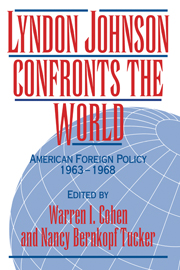Book contents
- Frontmatter
- Contents
- Dedication
- Acknowledgments
- List of Contributors
- Introduction
- 1 Lyndon B. Johnson: Change and Continuity
- 2 Johnson, Vietnam, and Tocqueville
- 3 “A Time in the Tide of Men's Affairs”: Lyndon Johnson and Vietnam
- 4 Threats, Opportunities, and Frustrations in East Asia
- 5 Toward Disillusionment and Disengagement in South Asia
- 6 Lyndon B. Johnson, Germany, and “the End of the Cold War”
- 7 The Promise of Progress: U.S. Relations with Latin America During the Administration of Lyndon B. Johnson
- 8 Keeping Africa off the Agenda
- 9 Balancing American Interests in the Middle East: Lyndon Baines Johnson vs. Gamal Abdul Nasser
- 10 Lyndon Johnson: A Final Reckoning
- Suggestions for Further Reading
- Index
5 - Toward Disillusionment and Disengagement in South Asia
Published online by Cambridge University Press: 05 June 2012
- Frontmatter
- Contents
- Dedication
- Acknowledgments
- List of Contributors
- Introduction
- 1 Lyndon B. Johnson: Change and Continuity
- 2 Johnson, Vietnam, and Tocqueville
- 3 “A Time in the Tide of Men's Affairs”: Lyndon Johnson and Vietnam
- 4 Threats, Opportunities, and Frustrations in East Asia
- 5 Toward Disillusionment and Disengagement in South Asia
- 6 Lyndon B. Johnson, Germany, and “the End of the Cold War”
- 7 The Promise of Progress: U.S. Relations with Latin America During the Administration of Lyndon B. Johnson
- 8 Keeping Africa off the Agenda
- 9 Balancing American Interests in the Middle East: Lyndon Baines Johnson vs. Gamal Abdul Nasser
- 10 Lyndon Johnson: A Final Reckoning
- Suggestions for Further Reading
- Index
Summary
When Lyndon B. Johnson was suddenly thrust into the Oval Office in November 1963, a daunting array of domestic and foreign policy issues competed for his attention. The direction of U.S. policy in the Indian subcontinent formed but one of those, and one that must have seemed far from urgent to a leader determined to concentrate his formidable energies on domestic affairs. Nonetheless, Lyndon Johnson could not long postpone a set of fundamental questions about the future American relationship with India and Pakistan, questions left unresolved at the time of his predecessor's assassination.
Kennedy's chief foreign policy advisers, all of whom were retained by a man determined to carry forward the Kennedy legacy, were unsure precisely where the new chief executive stood on matters pertaining to South Asia. With JFK's strong backing and direct participation, they had helped engineer a major shift in America's South Asia priorities over the past two years. The Sino-Indian war of October 1962 seemed to offer the Kennedy administration a unique opportunity to draw non-aligned India closer to the West. Convinced that India represented a political and strategic asset of potentially great value to the United States, Kennedy had hurriedly dispatched emergency military aid to that embattled nation while holding out the prospect for a generous, long-term military assistance agreement. The initiative had stalled, however, largely because of Pakistan's vehement opposition.
- Type
- Chapter
- Information
- Lyndon Johnson Confronts the WorldAmerican Foreign Policy 1963–1968, pp. 135 - 172Publisher: Cambridge University PressPrint publication year: 1995



